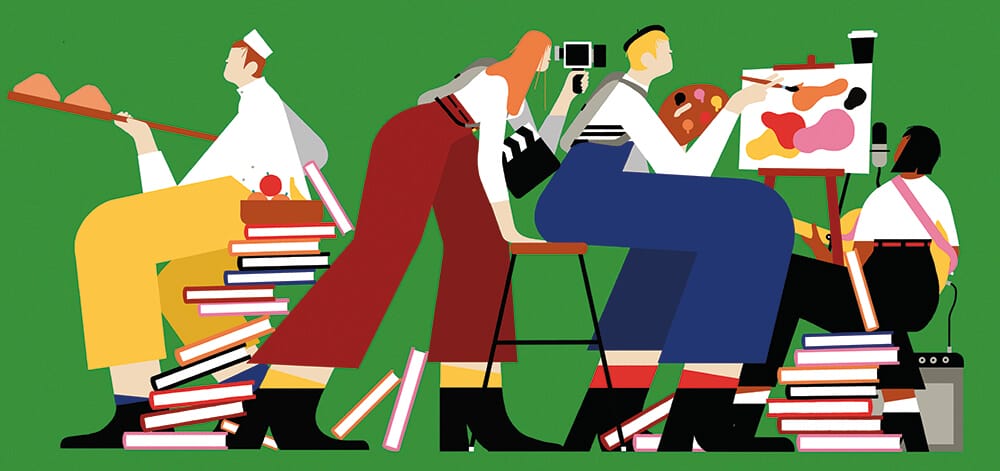It was 1 p.m. on a Sunday in Huntsman Hall, and its hallways and GSRs were buzzing with activity—a common scene for many studious and driven Penn students. The tables and chairs in the main forum were pushed to the sides the way they usually are for events like MBA networking and corporate recruiting, when suits, ties, and freshly printed résumés are a must.
This afternoon was different. Hundreds of students in sweats and t-shirts mingled in the forum, carrying cups of homemade ice cream, wearing headphones to listen to a student-curated podcast, cradling delicate 3-D-printed structures. It felt more like a colorful scene inside Willy Wonka’s chocolate factory than a traditional business event. In total, 11 students spent the spring semester pursuing 11 unique, creative pursuits. They came together to share what they had accomplished through the 2018 Wharton Passion Projects Showcase.
I was introduced to the program through the Wharton Dean’s Undergraduate Advisory Board (WAB), which I’d joined in my first few months at Penn. Launched in the fall of 2015, Passion Projects is a completely student-created, student-run initiative with the purpose of promoting self-discovery and a healthy work-life balance. Simply put, it’s a stress-free outlet for students to pursue the things they love.
In partnership with Wharton Wellness, the program provides an average of 15 Passion Projects Fellows with a maximum of $300 in funding each spring to spend the semester exploring a unique side of themselves and their interests. Applicants are mostly Wharton students, and they’re evaluated using four criteria—personal investment, feasibility, timeline, and budget; no startups or research projects are allowed. Over the course of just three years, the program has become a platform for more than 30 different students to embark on personal journeys and share their discoveries with more than 400 other students through the end-of-year showcases.
This year’s Fellows were nothing short of inspiring. Charlotte De Vaulx W19 had never explored 3-D printing, but in the spring, she studied the topic through a comprehensive book; soon she was designing and producing three-dimensional structures from mycelium biomaterials. Amanda Ngo W20 combined creativity and academic interests in developing a podcast called MindBox; she interviewed experts in a variety of fields, highlighted the ways they approach problems, and shared their methods in each episode. Griffen Croft W21 built an agriculture curriculum for Philadelphia schools. Abhi Motgi W20 remade halal food-truck dishes with healthy ingredients. Matthias Volker C21 crafted delicious desserts. Allyson Choi W18 climbed cliffs. The only limit to what a student can explore is his or her imagination.
The scope of these projects is virtually limitless, and often I found artistry in the simplest concepts. At one meet-up between all of the Passion Projects fellows, Zuhaib Badami C19 W19 handed me a piece of light brown card stock adorned with beautifully intricate characters in neat black ink. He spoke softly but confidently to our group about his journey to master Arabic calligraphy, an art that people can spend their whole lives perfecting. In a world full of digital typography, where a different font is one click away, I had never encountered someone so interested in creating beautiful script by hand—in a foreign set of characters, no less. It was incredible. His project is the epitome of what I came to love about Passion Projects: seeing the wildly different interests of my peers come to light.
At any school, it’s very easy to fall into echo chambers of people just like you. Yet at a place like Penn, there is the opportunity to engage with bright individuals from diverse, worldly backgrounds. Passion Projects bridges the gap not only between so many different students, but also between a student’s academic workload and personal interests. Something as basic as the concept of food can be interpreted in wildly different ways. Charles Du ENG17 W17 baked bread from different cultures, while Savi Joshi W19 published a Hot Cheetos cookbook. Vivian Guo W17 didn’t just pursue her love of music—she pushed boundaries by mashing up electronic and classical styles. Sometimes we need to recognize that there’s life beyond financial models, statistical analyses, and case studies.
Entering my junior year and my third year with Passion Projects, I’m excited to be part of a new journey with a fresh group of students. I’ll continue to be inspired by enthusiasm toward topics I may not have heard of before, and by the bonds that form between the Fellows. As this year’s showcase wound down, Matthias Volker, the dessert maker, shared a valuable lesson. “I’ve learned that I can fail at something and still love it,” he said, “and that something that makes you happy is always worth making time for.”
Nick Amore W20 is from Columbus, Ohio, concentrating in finance and business analytics and minoring in computer science. He loves engaging with Penn through the Wharton Dean’s Undergraduate Advisory Board and with the Philadelphia area through the Big Brothers Big Sisters program.
Published as “Not All Business” in the Fall/Winter 2018 issue of Wharton Magazine.

























